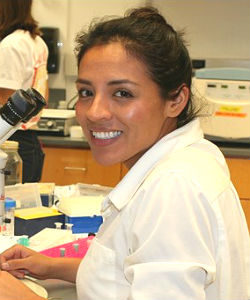
Jenny Aguilar, Ph.D.
Department: Pharmacology
Faculty Mentor: Aurellio Galli, Ph.D.
Dissertation Title: Drosophila as a model system to study neuropsychiatric and neurological disorders
Dissertation Abstract: In the central nervous system, dopamine (DA) plays key roles in voluntary movement, motivation, reward, and cognition. The DA transporter (DAT) is a primary regulator of DA homeodynamics. This presynaptic membrane protein drives the high-affinity reuptake of synaptically released DA, regulating the intensity and duration of DAergic signaling. Alterations in DAergic tone have been implicated in the pathophysiology underlying various neuropsychiatric and neurological disorders, including DAT Deficiency Syndrome (DTDS), Parkinson’s disease (PD), attention deficit hyperactive disorder (ADHD) and autism spectrum disorder (ASD). Further, all drugs of abuse, including the psychostimulant amphetamine (AMPH) elicit an increase in extracellular DA levels, which is associated with their rewarding and reinforcing properties as well as the neurobiological changes associated with addiction. To this end, years of research have focused on understanding how the DAT contributes to the DA dysfunction that underlies disease pathology. The work in this dissertation specifically addresses how alterations in DA tone promoted by DAT variants or psychostimulants confer behaviors associated with disease pathology. Foremost, we showed that DTDS-associated hDAT variant, R445C dampens DA tone to inhibit specific motor functions in Drosophila. We demonstrated that substitutions at R445C confer a channel-like intermediate in the hDAT that is associated with impaired hDAT function and expression. Drosophila expressing hDAT R445C exhibited lack of movement vigor and coordination that stemmed from a loss of DA neurons and decreased DA levels, paralleling molecular and behavioral phenotypes observed in DTDS and PD, more broadly. Next, we determined how alterations in DA tone contribute to the rewarding properties of AMPH; a process integral to addiction. AMPH alters psychomotor behaviors, at least in part, by promoting the reverse transport of DA (DA efflux) from the synapse, thus, increasing DA availability. We showed that DAT/lipid interactions regulate N-terminal phosphorylation, a modification required for DA efflux. Further, we found that DAT/lipid interactions facilitate electrostatic interactions within the DAT that are required for AMPH to elicit its rewarding and psychomotor effects in Drosophila. Finally, we demonstrated that the cathinone 3,4-methylenedioxypyrovalerone (MDPV) elevates DA tone, inducing hyperlocomotion in Drosophila. Specially, we showed that low concentrations of MPDV elicit DAT-mediated DA efflux. Additionally, acute administration of MPDV increased locomotor behavior in Drosophila, consistent with elevated DA levels.
